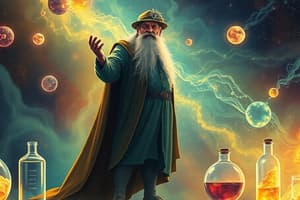Podcast
Questions and Answers
What term did Democritus use to describe the smallest indivisible particles of matter?
What term did Democritus use to describe the smallest indivisible particles of matter?
- Elements
- Molecules
- Atoms
- Atomos (correct)
According to Dalton, which of the following statements about atoms is correct?
According to Dalton, which of the following statements about atoms is correct?
- Atoms can be divided into smaller particles.
- Atoms can be created or destroyed.
- All atoms are identical within the same element. (correct)
- Atoms of different elements combine in arbitrary ratios.
What did Dalton contribute to the understanding of matter in the early 1800s?
What did Dalton contribute to the understanding of matter in the early 1800s?
- The idea that particles are visible to the naked eye.
- The notion that matter is made of energy.
- The theory that all substances are made of compounds.
- A model that explains that matter consists of atoms. (correct)
In Dalton's model, how do atoms combine to form compounds?
In Dalton's model, how do atoms combine to form compounds?
What feature of particles is indicated in the additional ideas added to Dalton's list?
What feature of particles is indicated in the additional ideas added to Dalton's list?
What is a molecule, as described in the content?
What is a molecule, as described in the content?
What does the term 'compound' refer to in the context of chemistry?
What does the term 'compound' refer to in the context of chemistry?
Which statement correctly reflects an idea proposed by Dalton?
Which statement correctly reflects an idea proposed by Dalton?
Flashcards are hidden until you start studying
Study Notes
Democritus
- Lived around 460–370 BCE as a Greek philosopher.
- Introduced the concept that all matter is composed of indivisible particles called "atomos," meaning 'indivisible' in Greek.
- Proposed that continuous division of matter would eventually result in particles that cannot be divided any further.
John Dalton
- Developed Democritus's ideas in the early 1800s, over 2000 years later.
- English chemist known for advancing atomic theory through experimental results from earlier chemists.
- Proposed that matter consists of tiny particles termed atoms.
Dalton's Key Ideas
- Atoms cannot be created or destroyed; they are indivisible.
- All atoms of a single element are identical; atoms of different elements vary.
- Atoms maintain their identity when forming compounds.
- Compounds are formed by atoms in simple whole-number ratios. Example: hydrogen and oxygen combine in a 2:1 ratio to form water (H₂O).
Additional Concepts in Atomic Theory
- Particles are microscopic and not visible to the naked eye.
- Particle movement varies with temperature; particles move faster when hot and slower when cold.
- All particles possess mass.
- Particles can cluster to form larger structures; their masses combine when they do.
- There are spaces between individual particles.
- Forces exist between particles to maintain structure and prevent separation.
Significance
- Dalton's model paved the way for the field of chemistry by enhancing the understanding of atomic behavior in substances.
- The rules derived from particle behavior contribute to the fundamental principles explaining the nature of matter.
Studying That Suits You
Use AI to generate personalized quizzes and flashcards to suit your learning preferences.




